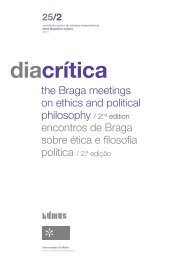Revista (PDF) - Universidade do Minho
Revista (PDF) - Universidade do Minho
Revista (PDF) - Universidade do Minho
Create successful ePaper yourself
Turn your PDF publications into a flip-book with our unique Google optimized e-Paper software.
220<br />
DIACRÍTICA<br />
citizen’s birthright. Now they are tossed into the marketplace, while their<br />
upwardly mobile peers win state-subsidized university educations.<br />
This is just plain wrong. Members of the middle class are no less<br />
citizens than members of the symbol using class. And for the first time<br />
in a long time, their claim to equal citizenship will be treated with<br />
genuine respect. For the first time, they will confront the labor market<br />
with a certain sense of security. The stake will give them the independence<br />
to choose where to live, whether to marry, and how to train for<br />
economic opportunity. Some will fail. But far fewer than today.<br />
We should, of course, structure the program to maximize the<br />
successes. For starters, no stakeholder should be allowed free use of<br />
his $80,000 without completing secondary school and passing a state<br />
or national qualifying examination. Dropouts would have their stakes<br />
held in trust, and could just spend the $4000 or $5000 in annual interest.<br />
This single requirement will prevent the massive waste of precious<br />
capital funds – call it «stakeblowing» – by those least capable of<br />
handling adult responsibilities. It will also provide a beacon of hope to<br />
children locked in rural poverty or urban ghettos. Stay in school and<br />
graduate, and you will not be forgotten. You will get a solid chance to<br />
live out the dream of economic independence.<br />
Some members of the underclass face multiple social problems –<br />
inadequate education, drug or alcohol abuse, a propensity to violence<br />
– that leave them ill-equipped to handle financial responsibility for<br />
their stake. Despite pervasive media images, the size of the so-called<br />
«underclass» is quite small – for example, it is less than 4 percent of<br />
the American population. Most of these people would be excluded<br />
from full control of their stake by the requirement of high-school<br />
graduation. As a consequence, they will only gain access to an annual<br />
interest payment of $4000 to $5000 a year. This will not be nearly<br />
enough to help them cope with their problems, and they should also<br />
receive special assistance.<br />
But for present purposes, the important point is this: We should<br />
not allow the special problems of a small minority divert our attention<br />
from the central problem posed by our emerging three-class society.<br />
Quite simply, there are tens of millions of ordinary people who are<br />
perfectly capable of responsible decision making in a stakeholding<br />
society, but are becoming the forgotten citizens of our globalizing<br />
economy. We should confront this problem now before the wealth<br />
gap widens even further.<br />
In designing a functional program, questions of timing will be<br />
crucial. In contrast to the Blair proposal, I would not give large stakes











![Programa [pdf] - cehum - Universidade do Minho](https://img.yumpu.com/17305425/1/190x135/programa-pdf-cehum-universidade-do-minho.jpg?quality=85)




